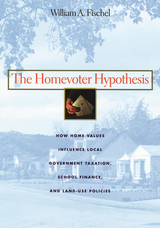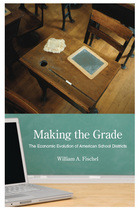
Just as investors want the companies they hold equity in to do well, homeowners have a financial interest in the success of their communities. If neighborhood schools are good, if property taxes and crime rates are low, then the value of the homeowner’s principal asset—his home—will rise. Thus, as William Fischel shows, homeowners become watchful citizens of local government, not merely to improve their quality of life, but also to counteract the risk to their largest asset, a risk that cannot be diversified. Meanwhile, their vigilance promotes a municipal governance that provides services more efficiently than do the state or national government.
Fischel has coined the portmanteau word “homevoter” to crystallize the connection between homeownership and political involvement. The link neatly explains several vexing puzzles, such as why displacement of local taxation by state funds reduces school quality and why local governments are more likely to be efficient providers of environmental amenities. The Homevoter Hypothesis thereby makes a strong case for decentralization of the fiscal and regulatory functions of government.

A significant factor for many people deciding where to live is the quality of the local school district, with superior schools creating a price premium for housing. The result is a “race to the top,” as all school districts attempt to improve their performance in order to attract homebuyers. Given the importance of school districts to the daily lives of children and families, it is surprising that their evolution has not received much attention.
In this provocative book, William Fischel argues that the historical development of school districts reflects Americans’ desire to make their communities attractive to outsiders. The result has been a standardized, interchangeable system of education not overly demanding for either students or teachers, one that involved parents and local voters in its governance and finance. Innovative in its focus on bottom-up processes generated by individual behaviors rather than top-down decisions by bureaucrats, Making the Grade provides a new perspective on education reform that emphasizes how public schools form the basis for the localized social capital in American towns and cities.

Are rent controls and zoning regulations unconstitutional? Should the Supreme Court strike down the Endangered Species Act when its administration interferes with the use of private property? These questions are currently debated under the doctrine of regulatory takings, and William Fischel’s book offers a new perspective on the issue.
Regulatory Takings argues that the issue is not so much about the details of property law as it is about the fairness of politics. The book employs jurisprudential theories, economic analysis, historical investigation, and political science to show why local land use regulations, such as zoning and rent control, deserve a higher degree of judicial scrutiny than national regulations. Unlike other books on this topic, Regulatory Takings goes beyond case law to buttress its arguments. Its reality checks range from reviews of statistical evidence to local inquiries about famous takings cases such as Pennsylvania Coal v. Mahon and Lucas v. South Carolina Coastal Commission. The gap between legal theory and on-the-ground practice is one reason that Fischel investigates alternative means of protecting property rights.
Local governments are often deterred from unfairly regulating portable assets by their owners’ threat of “exit” from the jurisdiction. State and federal government regulations are disciplined by property-owner coalitions whose “voice” is clearly audible in the statehouses and in Congress.
Constitutional courts need to preserve their resources for use in areas in which politics is loaded against the property owner. Regulatory Takings advances an economic standard to decide when a local regulation crosses the border from legitimate police power to a taking that requires just compensation for owners who are adversely affected.
READERS
Browse our collection.
PUBLISHERS
See BiblioVault's publisher services.
STUDENT SERVICES
Files for college accessibility offices.
UChicago Accessibility Resources
home | accessibility | search | about | contact us
BiblioVault ® 2001 - 2024
The University of Chicago Press









